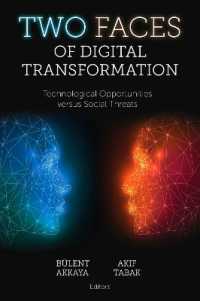- ホーム
- > 洋書
- > 英文書
- > Business / Economics
Full Description
The business world finds itself in a state of transition, driven in tandem by the strategies of digitalization and sustainable development. A complex process, various stakeholders approach the transition with different tools. Public authorities create the legal and institutional framework, companies fuel the process of technological innovation but also promote sustainable development in their activity. Social responsibility has become a key element of the business strategy also embraced by portfolio investors, universities, consumers.
Digitalization, Sustainable Development, and Industry 5.0 offers cutting-edge multidisciplinary research, with expert insights on the technologies and strategies businesses use in the twin transition process. The challenges of a Society 5.0-based new normal organizational model and the contributors' solutions both inform and teach regarding the present, as well as illuminate the path ahead. Understanding the best practices that have emerged in the twin transition allows researchers and practitioners alike to become more effective and serve as a launching point for future generations.
The chapters present strategies for academics, researchers, managers, practitioners, and entrepreneurs looking to use new information technologies for business development while protecting the environment. Administrators, educational leaders, policymakers, researchers and other professionals can utilize the extensive research on managing organizations and providing valuable leading and professional development initiatives as well as implementing the latest administrative technologies.
Contents
Chapter 1. Implementation of key enabling technologies (KETS) in nursing care processes in viewpoint of digital transformation; Sema Üstgörül
Chapter 2. Digital transformation and management of VUCA-RR environments in perspective of industry 5.0; Gözde Mert, Bulent Akkaya, and Apostu Simona Andreea
Chapter 3. Digital and sustainable products to achieve sustainable business goals along the path to industry 5.0; Iza Gigauri and Laeeq Razzak Janjua
Chapter 4. Human capital management and digitalization - From good practices and traditions to sustainable development; Valentin Vasilev, Dimitrina Stefanova, and Catalin Popescu
Chapter 5. Digital financial literacy and entrepreneurial performance: A percipience from a developing economy; Hiranya Dissanayake, Anuradha Iddagoda, Thanushka Rukshan, and Thilini Dehika
Chapter 6. AI and XR (AIXR) marketing in industry 5.0 or society 5.0; Osman Koroglu
Chapter 7. A framework for dealing with cybersecurity risks as part of information security; Monia Spagnolo, Valentina Ndou, Davide Giribaldi, and Valentina Arena
Chapter 8. Human resources in the context of digitalization; Gina-Cristina Dimian, Mirela-Ionela Aceleanu, and Ioana-Manuela Mindrican
Chapter 9. Implementing lean manufacturing approach in SMES. A case study from the food processing industry in Albania; Esmir Demaj and Denis Mehillaj
Chapter 10. Improving energy efficiency, after EU enlargement toward Eastern Europe, a first step toward smart energy consumption; Grădinaru Giani-Ionel, Țițan Emilia, Bătrîncea Ana-Maria, and Mihai Mihaela
Chapter 11. Online interaction with public authorities in the EU countries: What makes a difference; Maria Denisa Vasilescu, Larisa Stănilă, Amalia Cristescu, and Eva Militaru
Chapter 12. Exploring the relationship between digitalisation, sustainable development and industry. A bibliometric analysis; Adriana AnaMaria Davidescu, Eduard Mihai Manta, Andrei Pisică, and Diana Popa
Chapter 13. A scientometric overview of industry 5.0: The research developments in the European union; Maddalena della Volpe, Mónica Yuleni Castro Peña, Alexandra Jaramillo-Gutiérrez, and Lloyd Herbert Morris Molina
Chapter 14. Driving technologies of industry 5.0 in the medical field; Surjeet Dalal, Bijeta Seth, and Magdalena Radulescu
Chapter 15. The dynamics of energy transition policies in the times of covid-19 crisis and the conflict in Ukraine; Diana Joița, Carmen Elena Dobrotă, and Raquel Fernández-González
Chapter 16. The quintuple helix, industrial 5.0. and society 5.0; Ayşe Meriç Yazıcı
Chapter 17. Technostress and bornout of female employees: A review for the healthcare field in perspective of digital transition; Özge Topsakal and Hatice Irmak
Chapter 18. Crisis management for sustainable development: Converting business crises into benefit; Melis Attar and Aleem Abdul-Kareem







